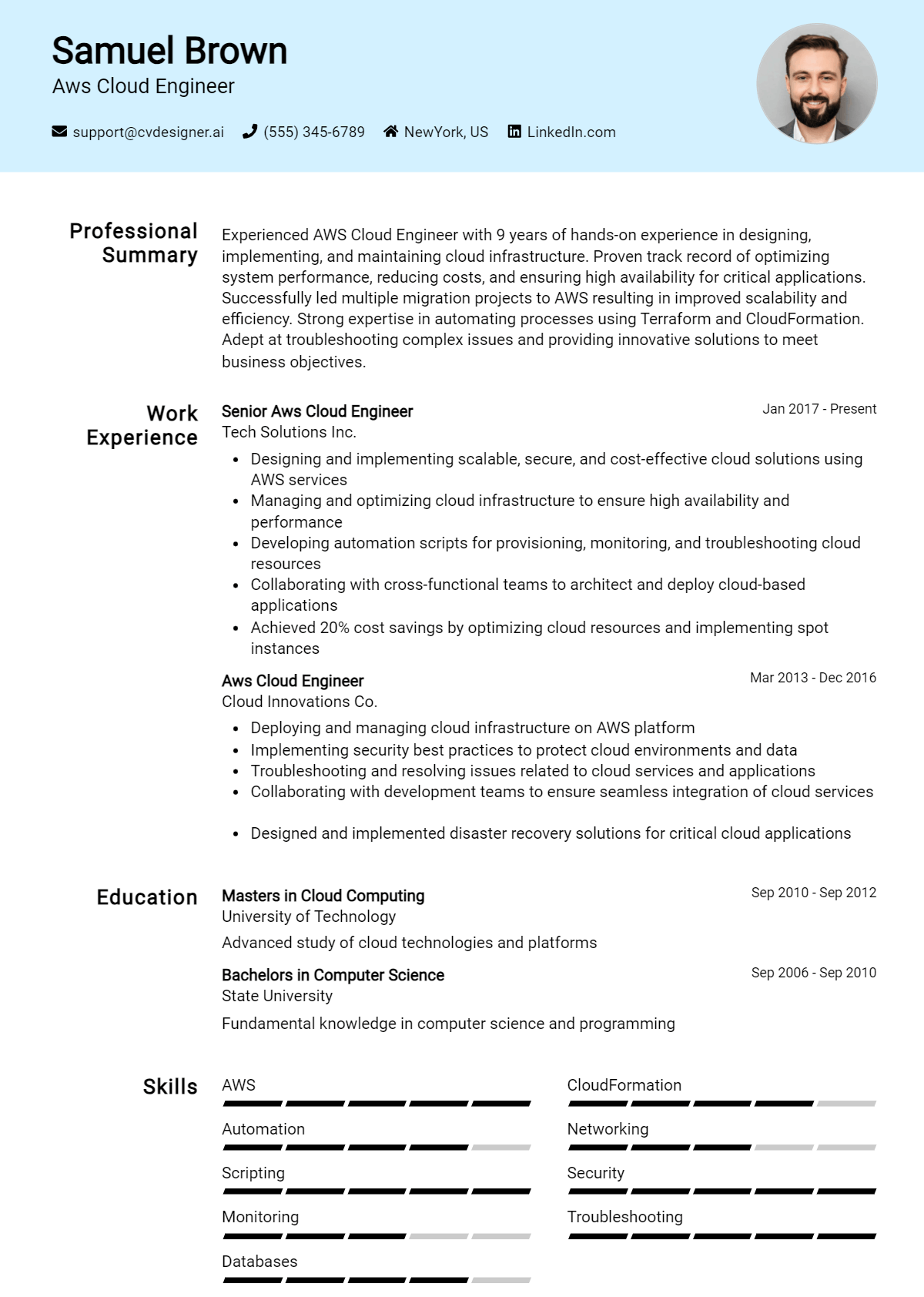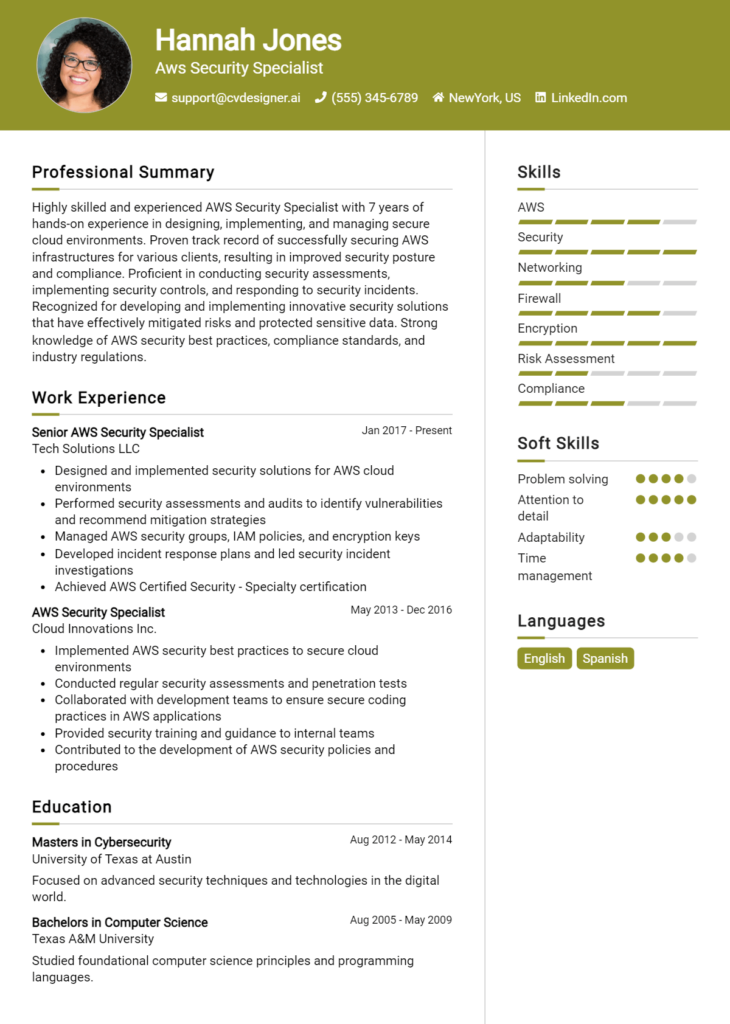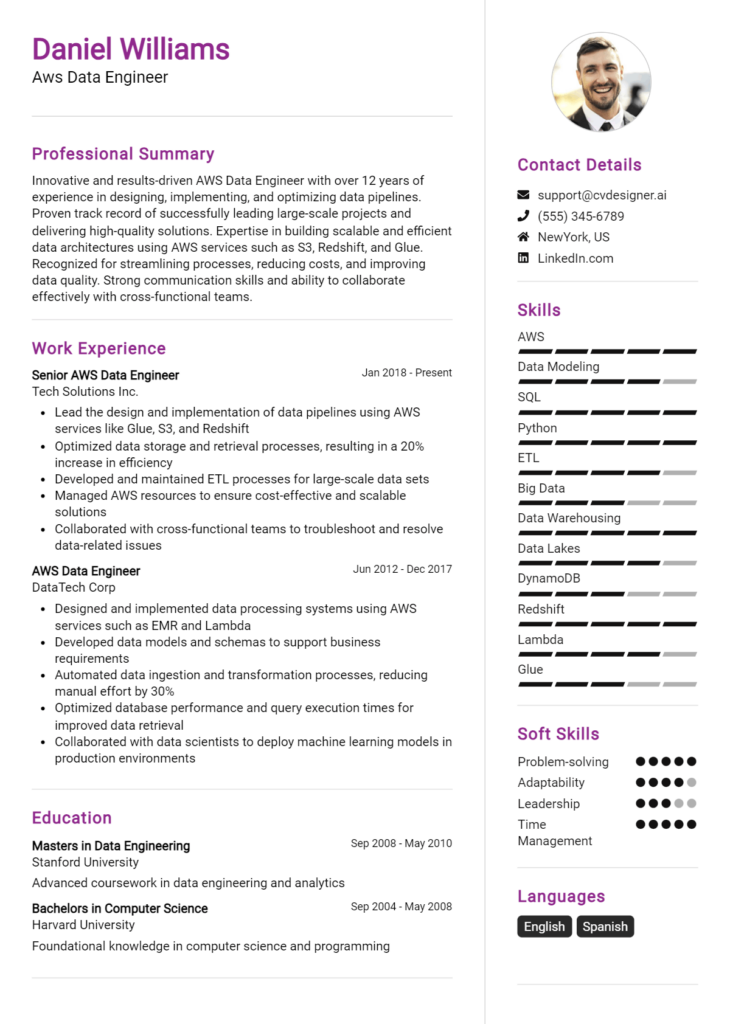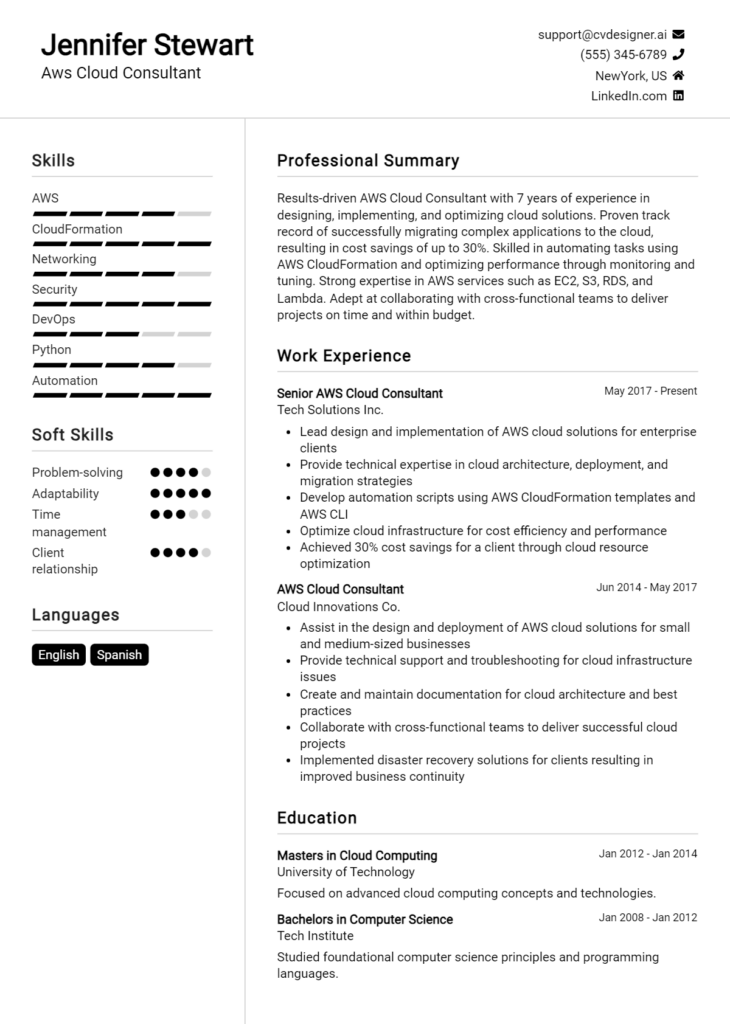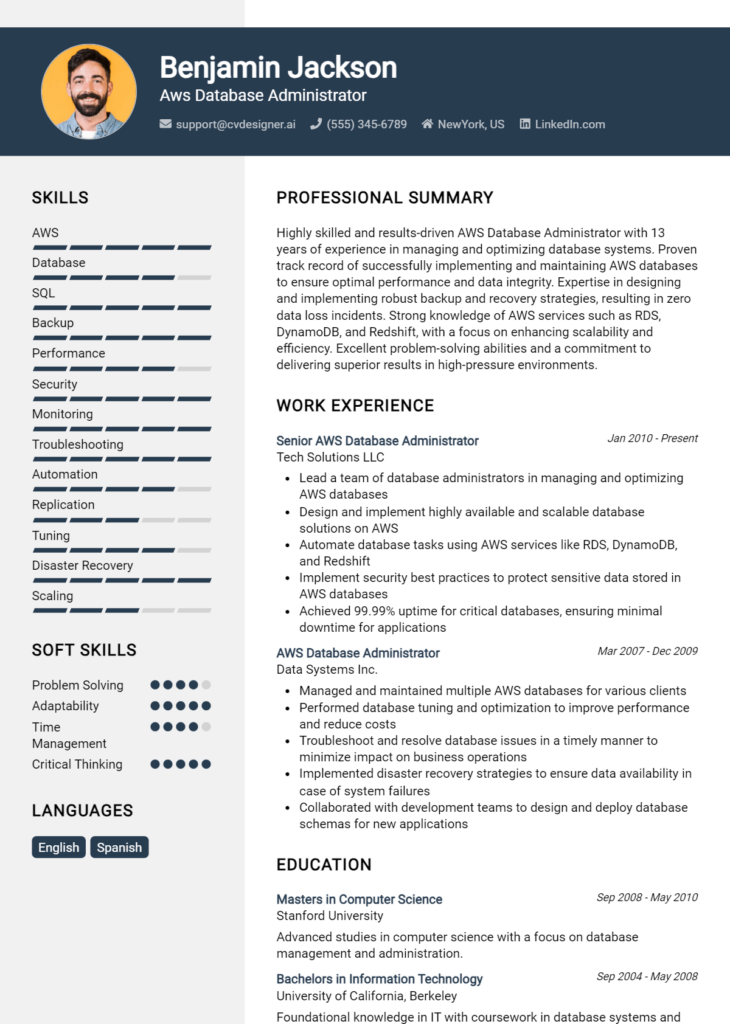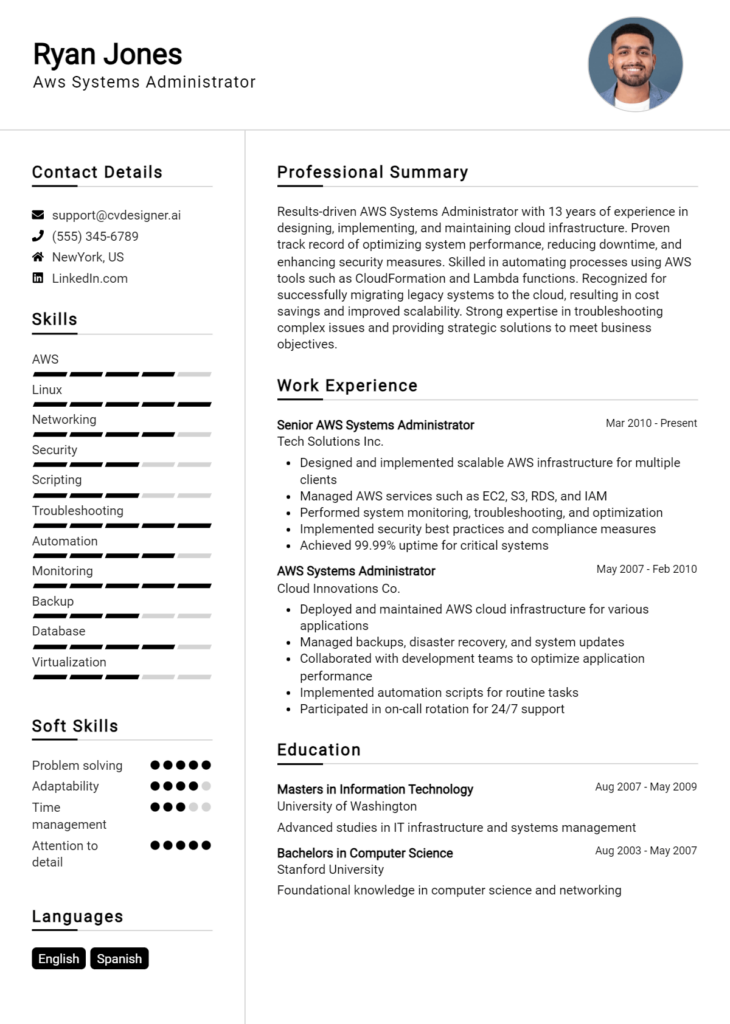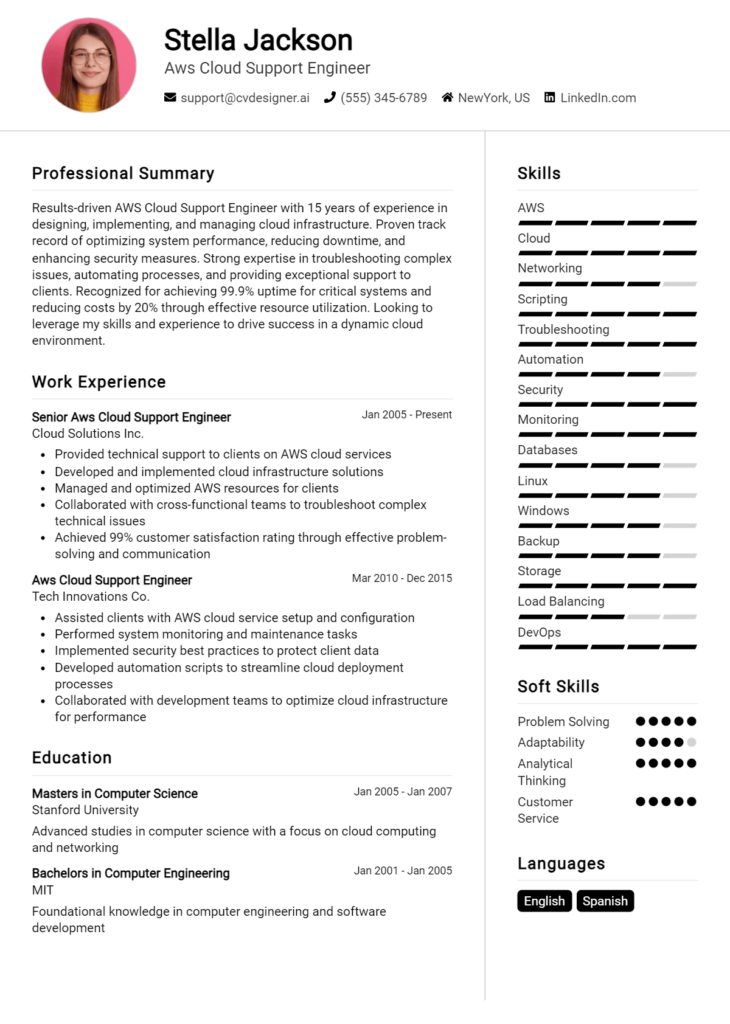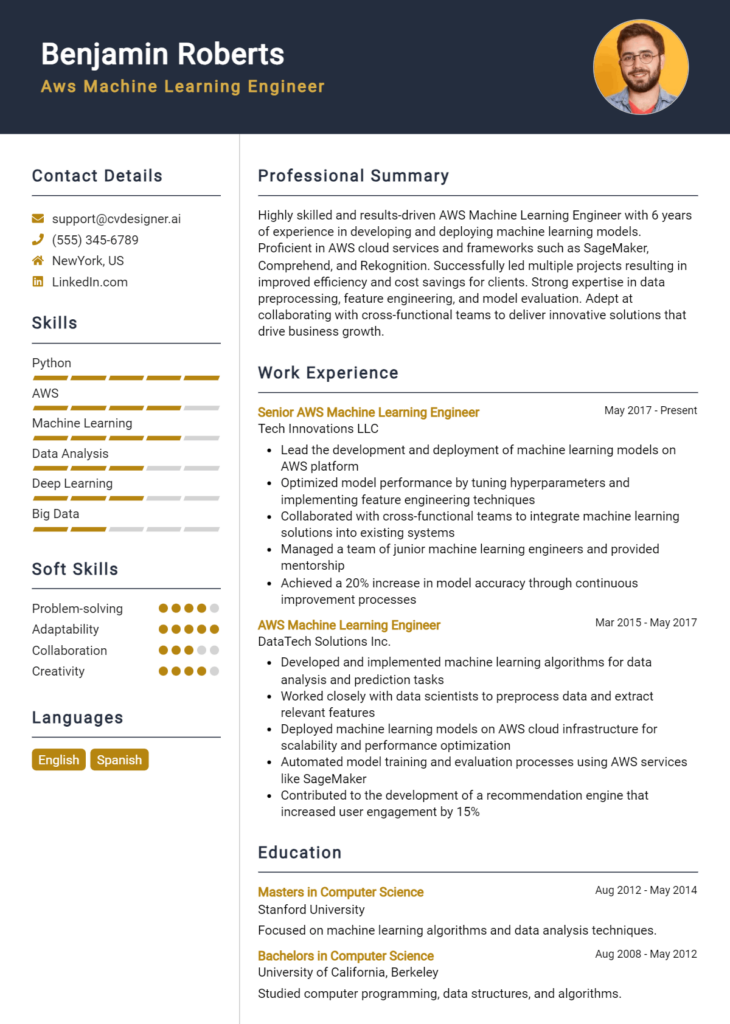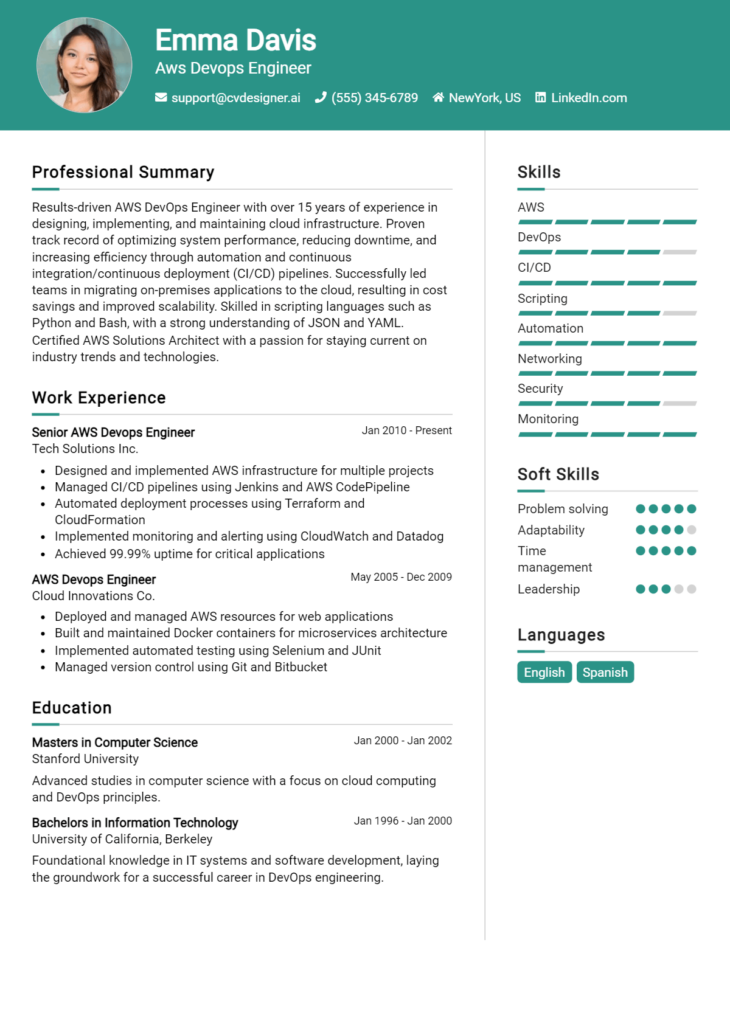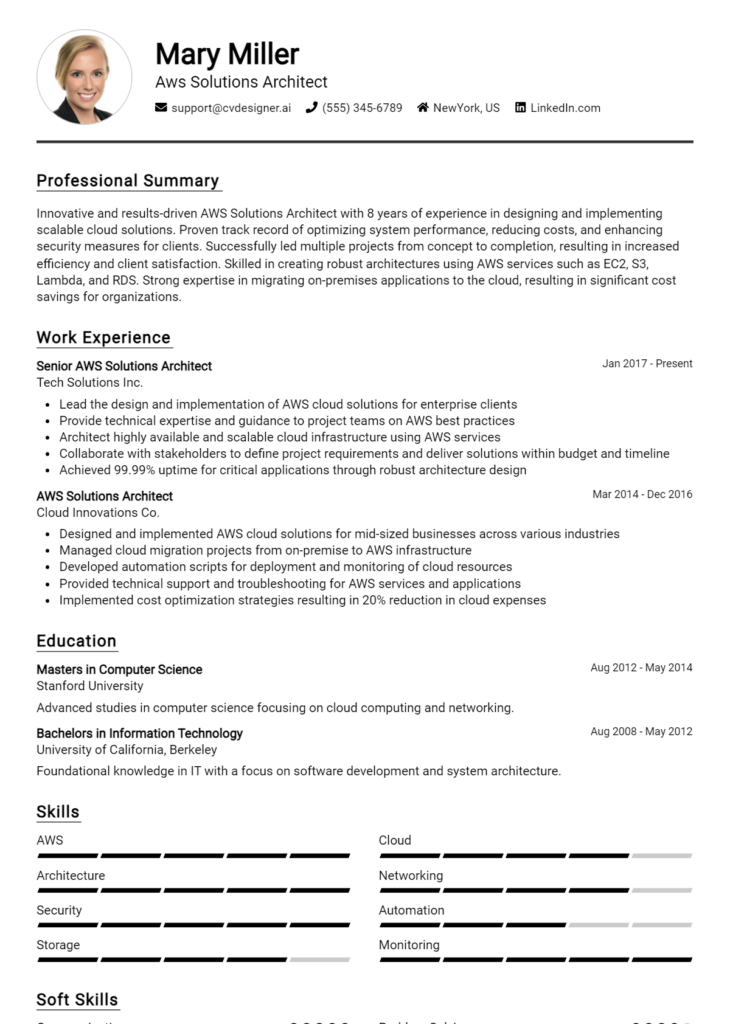Most Popular Aws Cloud Engineer Resume Examples
Explore additional Aws Cloud Engineer resume samples and guides and see what works for your level of experience or role.
As the demand for cloud computing continues to soar, the role of an AWS Cloud Engineer has become increasingly vital in modern IT infrastructures. These professionals are responsible for designing, deploying, and managing applications in the Amazon Web Services (AWS) environment, ensuring that organizations can leverage the full potential of cloud technology efficiently and securely. With such a pivotal role, having a well-crafted resume is essential to stand out in a competitive job market. A compelling resume not only showcases your technical skills and experience but also communicates your value to potential employers, opening the door to exciting career opportunities in cloud engineering.
In this AWS Cloud Engineer resume writing guide, we will delve into crucial aspects of creating a standout resume. We'll explore the key responsibilities and skills that hiring managers look for, outline the best formats to use for clarity and impact, and highlight common mistakes to avoid that could undermine your candidacy. Furthermore, you’ll find resume examples tailored for all experience levels, along with invaluable tips on crafting a winning resume. We’ll also provide guidance on selecting the right resume templates to enhance your presentation. By the end of this article, you’ll be equipped with the knowledge to create an impressive resume that effectively showcases your expertise in AWS cloud engineering.
Key Responsibilities and Skills for a AWS Cloud Engineer
As an AWS Cloud Engineer, you will play a critical role in designing, deploying, and managing cloud-based infrastructure and applications on Amazon Web Services (AWS). Your responsibilities will often include ensuring scalability, security, and performance of cloud systems while collaborating with development teams to implement best practices. Here are some of the key responsibilities associated with this role:
- Designing and implementing AWS cloud architecture solutions.
- Managing and optimizing cloud resources for performance and cost-effectiveness.
- Implementing security measures to protect cloud data and applications.
- Automating deployment and management processes using tools like CloudFormation, Terraform, or AWS CDK.
- Monitoring system performance and troubleshooting issues to maintain high availability.
- Collaborating with developers and IT teams to integrate cloud services into existing applications.
- Keeping up to date with the latest AWS features and services to continuously improve cloud solutions.
Essential skills required for an AWS Cloud Engineer include:
- Proficiency in AWS services (e.g., EC2, S3, RDS, Lambda, VPC).
- Experience with infrastructure as code (IaC) tools.
- Strong knowledge of cloud security best practices.
- Familiarity with containerization and orchestration tools (e.g., Docker, Kubernetes).
- Understanding of networking concepts and protocols.
- Proficient in scripting languages (e.g., Python, Bash).
- Excellent problem-solving and analytical skills.
- Strong communication and collaboration abilities.
When crafting your resume, it is vital to highlight these skills effectively in the skills section. Tailoring your responsibilities and skills to the specific job description can significantly enhance your chances of catching the employer's attention. Consider how these skills not only align with the job requirements but also demonstrate your ability to contribute to the organization’s cloud initiatives. Additionally, reflecting on these skills will be beneficial when creating a strong CV, showcasing your expertise and readiness for the AWS Cloud Engineer role.
Best Resume Format and Structure for a AWS Cloud Engineer
When crafting a resume for an AWS Cloud Engineer position, it's essential to choose a format that effectively presents your skills, experience, and qualifications. Here’s a detailed guide on the best resume format and structure, along with tips for each section.
Contact Information
- Placement: At the top of the resume.
- Content: Include your full name, phone number, email address, LinkedIn profile, and any relevant personal website or portfolio link. Ensure the email is professional and easy to read.
Professional Summary
- Purpose: This section provides a quick overview of your qualifications and career goals.
- Content: Write a 2-3 sentence summary that highlights your experience in AWS, key skills, and what you bring to the role. Tailor the summary to align with the job description, mentioning specific AWS services and tools you are proficient in (e.g., EC2, S3, Lambda, CloudFormation).
Work Experience
- Format: Use a reverse-chronological format to list your work history.
- Content: For each position, include the job title, company name, location, and dates of employment. Use bullet points to describe your responsibilities and achievements, focusing on quantifiable results and specific projects. Highlight your experience with cloud migration, infrastructure as code, and any collaborations with cross-functional teams.
Education
- Placement: Following your work experience.
- Content: List your degree(s), major, university name, and graduation year. If you have relevant coursework or projects that demonstrate your cloud engineering skills, consider including them as bullet points.
Skills
- Format: Use a bullet-point list or a categorized format.
- Content: Include both technical skills (e.g., AWS services, programming languages like Python or Java, DevOps tools) and soft skills (e.g., problem-solving, communication, teamwork). Tailor this section to the requirements of the job you are applying for.
Certifications
- Placement: After the skills section.
- Content: List relevant AWS certifications (e.g., AWS Certified Solutions Architect, AWS Certified DevOps Engineer). Include the certification name and the date obtained. If you are currently pursuing any certifications, mention them as well.
Additional Sections (Optional)
- Projects: If you have significant personal or freelance projects related to AWS, consider adding a section to highlight them.
- Professional Affiliations: Memberships in relevant organizations (e.g., AWS User Groups) can demonstrate your commitment to the field.
- Publications or Presentations: If you have published articles or given talks relevant to cloud engineering, this can also add value.
Formatting Tips:
- Use a clean, professional layout with clear headings and ample white space.
- Stick to a simple font (e.g., Arial, Calibri) and maintain a consistent font size throughout.
- Limit your resume to one or two pages, focusing on the most relevant experience and skills.
When paired with a well-structured cover letter, your resume can create a powerful application package. The cover letter should complement your resume by elaborating on key experiences and explaining why you are a good fit for the role. Use the same font and formatting style in both documents to ensure consistency and professionalism. Tailoring both your resume and cover letter to the specific job can significantly improve your chances of standing out to potential employers.
Writing Tips and Best Practices for a AWS Cloud Engineer Resume
When crafting a resume as an AWS Cloud Engineer, it's essential to tailor your document to highlight your technical expertise, relevant experiences, and accomplishments in cloud computing. Focus on showcasing your skills in AWS services, architecture, and deployment while using a clean, professional format that enhances readability. Remember that employers often scan resumes quickly, so utilizing industry-specific keywords can help your resume pass through Applicant Tracking Systems (ATS). Consider employing resume writing tips to ensure your resume stands out visually and effectively conveys your qualifications. Likewise, these practices are equally valuable when drafting a cover letter, as they can help you present a cohesive narrative about your professional journey.
- Use strong action verbs such as "designed," "implemented," "automated," and "optimized" to convey your accomplishments clearly.
- Quantify your achievements with metrics or percentages when possible, such as "reduced costs by 20% through cloud optimization."
- Incorporate industry-specific keywords relevant to AWS, such as "EC2," "S3," "Lambda," "CloudFormation," and "DevOps," to enhance your visibility to recruiters.
- Tailor your resume for each job application by aligning your skills and experiences with the specific job description.
- Highlight relevant certifications, such as AWS Certified Solutions Architect or AWS Certified DevOps Engineer, in a dedicated section to establish credibility.
- Organize your resume in clear sections (e.g., Summary, Skills, Experience, Education) to improve readability and allow for quick scanning.
- Avoid jargon that may not be understood outside of your specific role, and instead use clear, concise language to describe your responsibilities and achievements.
- Keep your resume to one or two pages in length to ensure that it remains focused and engaging for potential employers.
Common Mistakes to Avoid in a AWS Cloud Engineer Resume
When crafting a resume for an AWS Cloud Engineer position, it's crucial to present your skills and experience in a clear and compelling manner. However, many candidates make common mistakes that can diminish their chances of standing out in the competitive tech landscape. Avoiding these pitfalls not only enhances the clarity of your resume but also showcases your qualifications more effectively. Here are some common mistakes to steer clear of:
- Overloading the resume with excessive information or irrelevant details.
- Using generic descriptions that fail to highlight specific accomplishments or skills.
- Failing to tailor the resume to the specific job description and requirements.
- Ignoring the importance of formatting, leading to a cluttered or hard-to-read layout.
- Neglecting to quantify achievements with metrics or specific outcomes.
- Using technical jargon or acronyms without explanation, which may confuse the reader.
- Omitting essential keywords relevant to AWS and cloud engineering roles.
- Writing in a passive voice instead of an active voice that emphasizes your contributions.
- Not including relevant certifications or training specific to AWS technologies.
- Overlooking proofreading for spelling and grammatical errors that can undermine professionalism.
For a more comprehensive understanding of how to refine your resume, consider reviewing common mistakes to avoid in a resume. Additionally, it's equally important to pair your resume with a strong cover letter; you can learn more about pitfalls to avoid in your cover letter by checking out the common cover letter mistakes.
Sample AWS Cloud Engineer Resumes
As the demand for cloud computing continues to rise, the role of an AWS Cloud Engineer has become increasingly critical. This profession involves designing, deploying, and managing applications on Amazon Web Services (AWS). Below, you'll find three sample resumes tailored for different levels of experience in the AWS Cloud Engineering field: one for an experienced professional, one for an entry-level candidate, and one for a career changer. These samples will serve as a guide to help you craft your own compelling resume.
Experienced AWS Cloud Engineer Resume
John Smith
123 Cloud Lane
Tech City, CA 90001
(123) 456-7890
john.smith@email.com
Summary
AWS Certified Solutions Architect with over 7 years of experience in designing and implementing scalable cloud solutions. Proven track record in optimizing cloud infrastructure and enhancing performance while ensuring security compliance.
Skills
- AWS Services: EC2, S3, RDS, Lambda, CloudFormation
- Infrastructure as Code (IaC)
- DevOps Practices: CI/CD, Docker, Jenkins
- Networking: VPC, Route 53, Security Groups
- Monitoring Tools: CloudWatch, Splunk, ELK Stack
Professional Experience
Senior AWS Cloud Engineer
Tech Solutions Inc., Tech City, CA
June 2018 - Present
- Designed and implemented a multi-tier architecture on AWS, reducing costs by 30% while increasing application availability.
- Automated deployment processes using CloudFormation and Jenkins, resulting in a 50% reduction in deployment time.
- Collaborated with development teams to integrate CI/CD pipelines, improving code quality and delivery.
AWS Cloud Engineer
Cloud Innovations LLC, Tech City, CA
March 2015 - May 2018
- Managed AWS infrastructure for over 20 applications, ensuring high availability and disaster recovery.
- Conducted security audits and implemented best practices that led to a 40% reduction in vulnerabilities.
- Provided training and support for junior engineers on AWS services and best practices.
Education
Bachelor of Science in Computer Science
University of Tech, Tech City, CA
Graduated: May 2014
Certifications
- AWS Certified Solutions Architect – Associate
- AWS Certified DevOps Engineer – Professional
Entry-Level AWS Cloud Engineer Resume
Emma Jones
456 Cloud Avenue
Startup Town, CA 90002
(987) 654-3210
emma.jones@email.com
Summary
Recent Computer Science graduate with hands-on experience in AWS through internships and projects. Eager to apply knowledge of cloud technologies and contribute to innovative solutions.
Skills
- AWS Basics: EC2, S3, IAM
- Programming Languages: Python, Java
- Version Control: Git
- Basic Networking Concepts
- Troubleshooting and Problem Solving
Education
Bachelor of Science in Computer Science
Startup University, Startup Town, CA
Graduated: May 2023
Projects
- Cloud Deployment Project: Developed a web application hosted on AWS using EC2, S3, and RDS, successfully demonstrating a full deployment cycle.
- AWS Labs: Completed various online courses on AWS and obtained the AWS Cloud Practitioner certification.
Internships
Cloud Intern
Innovatech Solutions, Startup Town, CA
January 2023 - April 2023
- Assisted in the migration of legacy applications to AWS, gaining practical knowledge of cloud services.
- Conducted research on AWS best practices and presented findings to the engineering team.
Career Changer AWS Cloud Engineer Resume
Michael Brown
789 Tech Drive
Cityville, CA 90003
(555) 123-4567
michael.brown@email.com
Summary
IT professional transitioning to cloud engineering with 5 years of experience in systems administration. Completed AWS certifications and hands-on projects to strengthen cloud skills.
Skills
- AWS Services: EC2, S3, CloudWatch
- Linux Systems Administration
- Scripting: Bash, Python
- Database Management: MySQL
- Team Collaboration and Communication
Professional Experience
Systems Administrator
Global Enterprises, Cityville, CA
July 2018 - Present
- Managed and maintained server infrastructure, ensuring uptime and performance.
- Implemented monitoring solutions that improved incident response times by 25%.
- Led migration efforts to cloud-based solutions, enhancing overall system efficiency.
Education
Bachelor of Arts in Information Technology
City University, Cityville, CA
Graduated: May 2018
Certifications
- AWS Certified Cloud Practitioner
- AWS Certified Solutions Architect – Associate (in progress)
Explore more resume examples for inspiration to help you stand out in your job application. Additionally, corresponding cover letter examples can help create a complete job application package.
Checklist for a AWS Cloud Engineer Resume
- Proofread for Errors: Carefully read through your resume to catch any spelling, grammar, or punctuation mistakes. Consider using tools like Grammarly for assistance.
- Tailor Your Resume: Customize your resume for each job application by incorporating keywords and phrases from the job description to align your skills with the employer's needs.
- Check Formatting Consistency: Ensure that font sizes, styles, and spacing are consistent throughout the document. Use the same format for headings and bullet points.
- Highlight Relevant Skills: Clearly list skills that are pertinent to the AWS Cloud Engineer role, such as proficiency in AWS services (EC2, S3, Lambda), cloud architecture, and security best practices.
- Quantify Achievements: Whenever possible, include metrics or specific outcomes from your previous work, such as cost savings, performance improvements, or project completion timelines.
- Keep it Concise: Aim for a one-page resume that succinctly presents your qualifications, unless you have extensive experience that warrants a longer format.
- Include Certifications: List relevant AWS certifications (like AWS Certified Solutions Architect or AWS Certified Developer) to showcase your expertise and commitment to your professional development.
- Contact Information: Ensure your contact details are up-to-date and include a professional email address, phone number, and LinkedIn profile link.
- Use an AI Resume Builder: Consider utilizing an AI resume builder to help organize all elements of your resume effectively, ensuring a professional layout.
- Follow a Similar Checklist for CV: If creating a CV, you can apply similar guidelines to ensure clarity and professionalism. Check out templates available at CV Designer for inspiration.
Key Takeaways for a AWS Cloud Engineer Resume Guide
Crafting a compelling resume is essential for standing out in the competitive field of AWS Cloud Engineering. By utilizing the examples and tips provided in this guide, you can effectively showcase your skills, experience, and accomplishments to potential employers. Remember to tailor your resume to highlight relevant AWS certifications, hands-on experience with cloud architectures, and your proficiency in automation tools. To further enhance your application, consider downloading a professional resume template from resume templates or a tailored cover letter from cover letter templates. For those looking for a more streamlined approach, our best resume maker can help you design a polished and impactful resume with ease. Take the next step in your career by creating a resume that reflects your qualifications and sets you apart in the job market!
